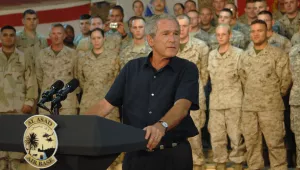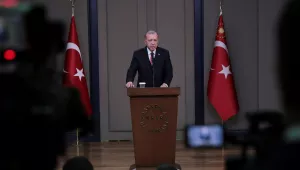As the international community dithers over Darfur, private military companies say they've got what it takes to stop the carnage, if only someone would hire them.
THREE YEARS OF FIGHTING in the Darfur region of Sudan have left an estimated 180,000 dead and nearly 2 million refugees. In recent weeks, both the UN and the US have turned up the volume of their demands to end the violence (which the Bush administration has publicly called genocide), but they've been hard pressed to turn their exhortations into action. The government in Khartoum has scuttled the UN's plans to take control of the troubled peacekeeping operations currently being led by the African Union, and NATO recently stated publicly that a force of its own in Darfur is "out of the question." Meanwhile, refugee camps and humanitarian aid workers continue to be attacked, and the 7,000 African Union troops remain overstretched and ineffective.
But according to J. Cofer Black, vice chairman of the private security firm Blackwater, there is another option that ought to be on the table: an organization that could commit significant resources and expertise to bolster the African Union peacekeepers and provide emergency support to their flagging mission.
A few weeks ago, at an international special forces conference in Jordan, Black announced that his company could deploy a small rapid-response force to conflicts like the one in Sudan. "We're low cost and fast," Black said, 'the question is, who's going to let us play on their team?"
Private security companies like Blackwater have thrived in Iraq, where the US military has relied on them for everything from guarding convoys to securing the Green Zone. But these companies recognize that the demand for their services in Iraq will eventually diminish, and Blackwater, for one, is looking for new markets. It's not alone in seeing peacekeeping as a growth area. Competitors such as Aegis and Dyncorp have also realized that while conflicts like the one in Darfur may not bring them profits on the order of Iraq, there's no shortage of them. And if such companies are able to help the international community succeed in peacekeeping, it could improve the image of an industry that hasn't enjoyed much support from the press or the public.
Private military companies have had a hard time convincing the international community that privatizing peacekeeping would be as good for Darfur, and for the rest of the world, as for their industry. In part that's because of the mixed reputation their work in Iraq has earned them and because the explosive growth of the industry has raised fears that security contractors working for the US government in Baghdad (and post-Katrina New Orleans) could become bona fide armies for hire. But the discomfort also has deeper roots, in the complicated history of private intervention in these kinds of conflicts. When Kofi Annan was UN undersecretary general for peacekeeping, he explored the option of hiring the South African private military company Executive Outcomes to aid in the Rwandan refugee crisis. He ultimately decided against the option, declaring that "the world is not yet ready to privatize peace."
The world still appears to be unready—and representatives of private military companies believe that's shortsighted. "When traditional peacekeepers can't provide an adequate response because of their home country obligations, there's an alternative that should be openly and frankly discussed. And that's a private professional group," says Chris Taylor, Blackwater's vice president for strategic initiatives. As he sees it, his company could provide the necessary security in places like Darfur "so that traditional NGOs and aid agencies could do the work they can't do [now]."
The UN and others clearly have legitimate questions about whether private military companies can do what they claim. But the industry, agitating to lend a hand where the international community has dragged its feet, has raised some legitimate questions of its own. When the world's governments and multilateral organizations have proven as ineffectual as they have in Darfur, should they turn to the private sector for help? In the absence of a viable alternative, is the international community's aversion to what some call "mercenarism" stronger than its will to fight genocide?
Private contractors have been providing logistics in low-intensity conflicts in African nations for years, and conducting training operations as well. Dyncorp, for example, is currently involved in what is by most accounts a very successful mission in Liberia, helping train the army and national guard in the aftermath of Liberia's long and bloody civil war.
Indeed, while the industry has grown and matured in Iraq due to the US military's unprecedented reliance on contractors there, it's actually in Africa that early private military companies first did significant work.
In the mid and late '90s, the South African firm Executive Outcomes and British firm Sandline International offered direct combat support to the governments of Angola and Sierra Leone. In Angola, 500 ex-special forces officers working for Executive Outcomes conducted sophisticated airstrikes and commando operations to help the Angolan military retake its diamond mines and oil fields from the rebel group UNITA. In Sierra Leone, Executive Outcomes and later Sandline were hired to combat the RUF insurgency. With targeted helicopter attacks and ground assaults, both firms dominated tactically, but fighting broke out soon after their respective contracts ended.
The legacy of these operations, as a result, is mixed. On the one hand, the firms' tactical prowess efficiently and effectively stopped the fighting, saving thousands of lives and leading to the return of over a million refugees. But the benefits were not long-lasting.
What companies like Blackwater are proposing to do in Darfur today is very different from the combat missions of a decade ago. "We have no interest in offensive operations," says Taylor flatly. Doug Brooks, president of the International Peace Operations Association, the industry's trade association, agrees: "[Executive Outcomes] and Sandline were supporting offensive combat operations. I don't think that'll happen again, and certainly not that way."
Today, private military companies are offering defensive services—they propose to secure refugee camps and vulnerable villages, guard humanitarian aid agencies and NGOs, or, depending on the requirements of the contract, assist peacekeepers like the African Union troops in Darfur. "Security work is more about avoiding violence, it's not about inflicting violence," says Joe Mayo, formerly with the security and training firm Triple Canopy, and now an independent consultant to the industry. "A good day for a security guy is when nothing happens."
Aid agencies and NGOs in Darfur haven't had many good days lately. The beleaguered African Union peacekeeping force has few resources to spend defending an NGO like Save the Children, and the ability of such organizations to continue working in the area is very much in question. 'You can't expect people to work in conflict zones without protection," says Christopher Kinsey, a scholar with the Joint Services Command at King's College London and author of the forthcoming book "Corporate Soldiers and International Security" (Routledge), "especially as noncombatant immunity is no longer respected." Kinsey believes there's a legitimate role for private military companies in humanitarian operations.
There's little question that companies like Blackwater could be more effective operationally than the African Union, which has been hampered by its peacekeepers' lack of command and control experience. Private military companies boast a roster of former special forces officers and law enforcement officers who are accustomed to volatile conflict and post-conflict areas like Sudan.
Blackwater also subjects all of its personnel to an impressive array of extra training—whether they're training to work in Baghdad or the firm's North Carolina headquarters. They take classes in international humanitarian law, leadership, ethics, regional awareness, and "customs and traditions." They've recently approached Amnesty International about teaching human rights education classes. And the International Peace Operations Association boasts that its code of conduct was written by human rights lawyers.
The industry also claims that it's far cheaper than its multilateral or military counterparts. "We offer the ability to create a right-sized solution-which creates a cost savings right off the bat," says Taylor. By contrast, Brooks notes, "NATO is insanely expensive; it's not a cost-effective organization. Neither is the [African Union]. Private companies would be much, much cheaper. When we compared their costs to most UN operations, we came up with 10 to 20 percent of what the UN would normally charge."
But while many would agree that there's an enormous need for the peacekeeping services that companies like Blackwater are willing and able to supply, that does not mean there's a market. "The question isn't their operational ability," says David Isenberg, senior analyst at the British American Security Information Council, 'they've demonstrated an ability at least equivalent to a decently run UN operation. It's a question of political will."
As the industry is the first to admit, this political will remains elusive. "The political dimension to this discussion is far more difficult than the tactical dimension," says Taylor. In 2003, a consortium of for-profit companies was formed to try to supplement the UN mission in Congo with everything from aerial surveillance to "armed rapid deployment police." It was never adopted. Asked whether the UN's official position on using private security contractors has changed, UN spokesman Farhan Haq replied, "The one-word answer is no."
Such an answer may suggest a reflexive discomfort with privatizing force. But it also represents some nuanced, widely shared concerns. The first, and most common, is accountability. And it isn't merely hypothetical, considering the alleged involvement of private contractors in the Abu Ghraib prison scandal, the recent conviction of the military contractor Custer Battles for government contract fraud in Iraq, and earlier, in Bosnia, the involvement of Dyncorp contractors in a forced prostitution ring.
"There are some legitimate reasons to be skeptical," allows Isenberg. 'How do you ensure oversight, compliance with international humanitarian law, follow the rules of warfare, rules of engagement, comply with the Geneva Conventions, and the whole bureaucratic panoply of rules that come into play?" Particularly when you're trying to preserve fast, flexible, and inexpensive deployment.
Compounding the problem of accountability is the fact that private companies are of course not just out to save the world, but to make money. Assuming an industry made up of rational actors, eager to maximize profits, can loyalty to a particular firm—or a particular client—be maintained? Can standards? What happens when there are conflicts of interest? The industry claims that it would only accept contracts from legally recognized bodies, but what if this body were an unsavory regime?
Without uniform regulation of the private military industry, the answers to these questions largely depend on one's faith in the market's power to encourage good behavior. As Kinsey sees it, the industry actually takes corporate responsibility quite seriously. "It's not because the companies are being altruistic," he says. "It's beneficial in the long term for them to conduct themselves responsibly."
More fundamentally, many believe that the international community has a special responsibility to take on problems such as Darfur—and that outsourcing humanitarian interventions to the private sector is just another way of sidestepping the hard political debates that should take place in public.
But the abstract ideal of an engaged international community might seem a rarefied consideration in light of the realities on the ground.
"This came up a long time ago. People were saying that if we use private sector in the Congo, the international community will never get its act together," says industry spokesman Doug Brooks. "But that was 3 million dead Congolese ago. The international community isn't going to wake up no matter how many people you kill. I think that it would be a good idea for the international community to get its act together. But we've got to find another way."
Rebecca Ulam Weiner is a fellow at the Kennedy School of Government at Harvard University.
Weiner, Rebecca. “Peace Corp..” The Boston Globe, April 23, 2006
The full text of this publication is available via The Boston Globe.





